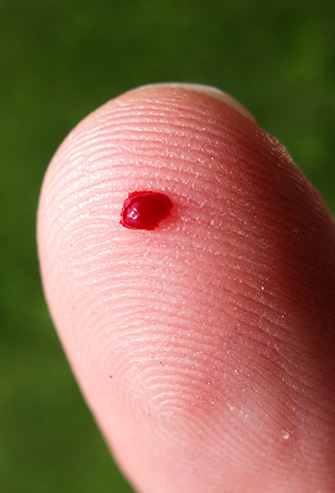Blockades

"It's not the seize of the wound that matters, but the way we treat it."
Blockades are a residu of what once was a succesful strategy to handle a challenging situation. When somewhere in the past there was punishment or another unpleasant consequence following 'mistakes', people develop the (often hidden) 'conviction' that it is 'unsafe' to talk about things that go wrong. This conviction often continues to live on even when the people around them and the rules in their lives or organisation change. In order for knowledge and skills to work properly, we need to address the (hidden) convictions, that keep us from doing what we know we want and what we know works.
Blockades prevent us from acting effectively
Studying trauma I came to the conclusion, that the severity of the unpleasant or traumatic events has far less effect than the way it has been treated. Even the smallest injury can lead to serious infections when we use infected needles or tissue. At the same time very big wounds can heal without leaving much more than a skar. Infections from physical wounds often come out as pain, fever and eventually the impossibility to act effectively. 'Infections' from emotionally unpleasant events can have a similar effect. It can lead to:
- plans that are not implemented and/or easily forgotten.
- people that react strongly to rather 'small' incidents.
- conflicts that tend to increase both in severity and amount of conflicts.
- people that tend to withdraw from interaction.
It's important to know, that this behaviour was at one moment in our lives the 'best' strategy to get our needs fulfilled. Why would you support a plan from 'others', if your experience is that you will not get the same support for what is important to you? Why would you be calm, when your experience is that people only listen when you speak first, loud and with strong emotions? Past experience gives us a set of 'survival' mechanisms and convictions that have been useful in the past and often still are useful now, but are accompanied by undesirable side effects we now try to drastically reduce. When the survival mechanisms take over, people may have all the knowledge and skills they need, but still can't do what needs to be done for healthy and harmonious relationships with themselves and/or others.
First aid training
The treatment of physical wounds show us two complementary approaches:
- first aid: where we focus on what can be done when wounds first occur
- handling infections: where we focus on what can be done, when wounds lead to 'infections'
I found that the treatment of unpleasant and traumatic events is connected to a specific set of needs. First aid training helps us to find strategies to fulfill these specific needs, which can be easily explained when we look how parents support little children, when they fall as they are learning to walk. (More...).
Changing ineffective patterns
First aid training helps to reduce the chances of unpleasant and 'traumatic' events turning into blockades and other undesirable behaviour. As with physical injuries however we'll find that for several reasons first aid was and is not applied or not applied properly. For the 'victim(s)' of the unpleasants events this means, that they have to deal with two sets of unfulfilled needs:
- needs not fulfilled due to the unpleasant or traumatic event
- needs not fulfilled due to ineffective treatment (more ...)
Unpleasant feelings like irritation, saddness or fear are signals that one or more of your needs are not fulfilled (see Kommunikasie). Based on my experience I would say, that the unfulfilled needs caused by bad treatment are the most painful and have the deepest impact on people. The unpleasant and traumatic events show people, that there are experiences that they can not prevent from happening. Ineffective treatment however sends out an even more painful message: it's impossible to get the proper support to handle unpleasant events. In other words not only did you experience something (very) unpleasant like for instance someone shouting at you, but it is difficult (if not impossible) that you will get the proper support to deal with it, starting with someone (friend, colleague, manager) who takes the thing that happened to you seriously.
Regaining trust that things can be improved again
In my work I try to let people experience that it is possible to get the support they need, starting NOW. To do this I focus on two pilars:
- fufilling the set of specific needs connected to treatment of unpleasant events
- finding and changing (hidden) blockades and convictions by Transformative Listening
Which needs we have to address and which strategies work, will depend on both the history and characteristic you and the people around you. Sometimes safety is at such a low level, that we need to address that first. At other moments we need to listen to strong feelings and figure out which (old) story lies behind the frustrating things that are happening now. The wide range of methods I use, enables me to offer you a tailor made solution for the challenges you face and can be an important step to create the future you want in your life, with your partner and all the other people you share your life with.

